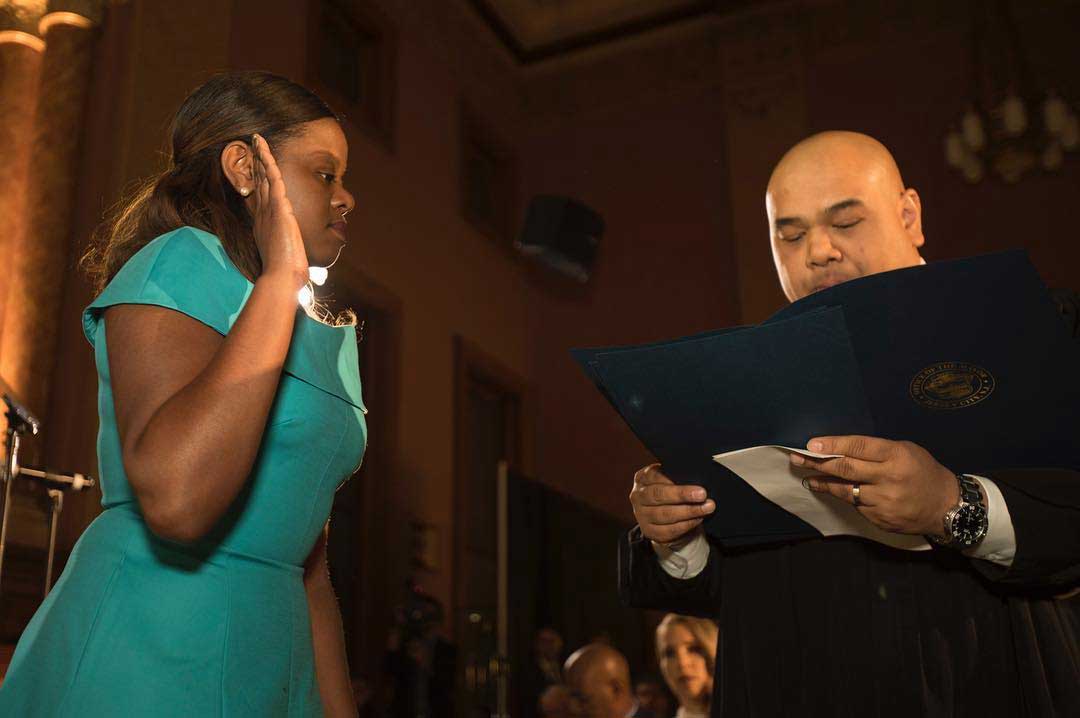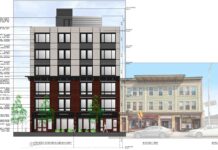Editor’s Note: This is part one of an ongoing interview series with Jersey City’s nine city councilpeople. Jersey Digs has invited all city council members to participate in the Q&A about their outlooks on topics ranging from development and crime to transportation and the tax revaluation for their respective wards. The interviews have been edited and condensed for clarity and length.

Ward A — the Greenville section of Jersey City — is the city’s most expansive ward, and it remains the most underdeveloped area of Jersey City. Bordering Bayonne, the West Side and Bergen-Lafayette neighborhoods, Greenville is comprised of two gated communities — Society Hill and Port Liberté — Country Village, as well as parts of Martin Luther King Drive and Ocean Avenue.
With the largest project in the pipeline for Ward A — Bayfront — stalled and mired in controversy, other neighborhood revitalization projects strive to bring new life to Greenville. The “I Love Greenville Community Plan,” facilitated by the Garden State Episcopal Community Development Corporation (GSECDC), prioritizes home ownership. A recent proposal for a 225-unit development, spearheaded by Greenville based non-profit, the Community Outreach Team, Inc. (COT), would bring affordable and senior housing to the area.
Yet, while significant focus is often given to downtown Jersey City’s ever changing skyline, Greenville has been at the center of the city’s largest demographic change of the past five years — the sudden increase of Hasidic Jews moving to the neighborhood. Tensions between longtime residents and the ultra-Orthodox Jews led the city to pass a No-Knock Ordinance last spring. Though tensions have since simmered, the Hasidim arrival in Jersey City coupled with the anticipated citywide impact of the tax revaluation indicates greater shifts are on the horizon for Greenville.
Elected following the runoff elections on December 5, Denise Ridley begins her first term as Ward A councilperson. Ridley, a lifelong Jersey City resident and community activist, is Ward A’s first African-American councilperson. Ridley describes Ward A as “a mesh of everything in the city.” Knowing that the residents of Ward A have subsidized the rest of Jersey City for too long, Ridley sees the promise for Greenville’s future following the tax revaluation. “There’s not much we can do to go back to alleviate the past,” says Ridley. “But I’m hoping that the outcome of this reval will give residents in Greenville a little more peace of mind of where they’re going to end up.”
But Ridley wants to see more resident involvement on new development, resolution for increased gun violence and transportation issues, and an increase of affordable housing in the area that preserves the neighborhood’s diversity. “That’s what I think makes us special and what I love about Ward A and the Greenville area because it’s just very diverse,” explains Ridley. “I want to make sure we work on that and we work on bridging the gaps between all of those communities to make sure we work towards a common goal.”
Jersey Digs: What are your top priorities for your first term as Ward A councilperson?
Denise Ridley: What I’ve been focusing on during the campaign and what I plan to continue is, of course, make sure we have a good handle on crime in the area. The property tax revaluation is a concern to residents, and we’ve just received some preliminary estimates, which looks pretty hopeful for Greenville.
And also redevelopment. We want to make sure the development that is coming to Ward A includes the residents and that there are projects that are geared towards our lifestyle in Ward A. Needs change throughout the city so we want to make sure we have responsible development coming in to Ward A.
JD: With the reval coming up, and all of these concerns about keeping longtime residents, people on fixed incomes, senior citizens in their homes, how and what are you seeing you need to do as a councilperson, what steps are you taking to educate residents?
DR: There’s not much we can do with controlling the outcome of the revaluation. But we want to make sure residents have all the information that they can. So some of the things that we did during the campaign was to talk to different tax attorneys to get some feedback. We want to make sure once the new assessment does come out that the residents understand how to do tax appeals. Just have some assistance there for them to take them through that process because nobody wants to see residents have to move or have to disrupt their lifestyle. And hopefully that won’t happen too much in Greenville.
JD: Do you think the reval is going to be beneficial to Ward A?
DR: Based on the numbers we have now, it looks like it will. That does create another issue because I have some residents that have already said to me, “We’ve been getting cheated all these years.” And we’re happy it looks like our property taxes are going down but the rest of the city has been on our back all of this time.
JD: In other parts of the city like along Palisade Ave. and West Side Ave., a restaurant overlay zone encouraged new restaurants and businesses to open up. Do you think Ward A would benefit from something similar?
DR: Yes. Even though a lot of residents feel like there’s a lot of people there, we don’t have a lot of high rises and tons of people in one building so the density, it isn’t really there. But I think that if we can encourage entrepreneurship and small businesses, I think that Ward A would benefit from a lot of the mom and pop type shops. If we can reactivate corridors like Ocean Avenue — we have a smaller portion of Martin Luther King Drive, there’s a couple stores on Old Bergen Road area near Danforth — if we can kind of tap into those things, I think it would be beneficial to the community. It would bring some new life to the area as well.
JD: Newark recently passed an inclusionary zoning ordinance mandating an 80-20 market rate-affordable housing split. Do you want to see a similar citywide affordable housing ordinance in Jersey City?
DR: I would like to see more availability of affordable housing. The city has an affordable housing tracker where you can see where there’s a new development and what the income levels are. So I think that’s helpful. I think we need to promote that more because a lot of people don’t realize it’s there. But I do think there needs to be certain rules where we make sure there’s a certain percentage for affordable housing.
JD: We hear a lot about “the tale of two cities.” There’s Downtown Jersey City that’s being rebranded and there’s other parts of the city that are overlooked. There might be violence or homelessness. Do you think Greenville would benefit from a rebranding or repositioning? Or would you like to avoid that because it will create new problems in the ward?
DR: I think that we would benefit from some sort of rebranding — and what you just said about it creating more problems — it may. Because with rebranding, it might draw more attention. So I always tell people you have to be careful what you ask for. Of course we want a surge in the community but at the same time when that happens — and you get new development and you get new people — prices tend to rise. You can’t have all of this new stuff and expect prices to stay the same. So I think it’s trying to find a balancing act of somewhere in the middle where we get that resurgence of pride in the community. Then, at the same time, it’s not being overtaken by an influx of people moving in and other people having to move out.
There’s a happy medium somewhere in there. Because at the same time, it’s good to have that new energy and new outlook and different community groups starting, people bringing more arts into the area. Just different things. So I think that if we get an upsurge of productive residents who really want to be involved in the community and assist with that process, while not pushing out older residents or overtaking the older residents, then I think we’ll be good. Because honestly, we all have the same concerns, whether you live in the gated community or whether you live on the blocks. Everybody’s concerned about crime. Everybody’s concerned about taxes. Everybody’s concerned about the development coming. So if we can work on those things together, then I think we can move forward and be a really progressive ward.
JD: There has been an uptick in gun violence in Jersey City as a whole. Can you speak a little about crime in Greenville, and your ideas for reducing it and even the causes behind it?
DR: Violence is always a concern and I believe in community policing. For me, that’s not just cops walking the beat but cops really being a part of the community. One of the things I did before starting this campaign was I held meet and greets between the new police recruits in the community. So when there’s a new class going off to the police academy, we have these meetings and the residents get to speak to them and tell them their concerns. What they want them to know as a possible new officer coming in. I think that was really great and that we need to keep doing things like that so that the community can relate to the police, the police can relate to the community. They know the community that they’re serving.
I also believe that we need to work on making sure that we are communicating opportunities that are available so that people have jobs. It is very difficult when you’re coming out of jail, looking for a job. If we can implement some more programs for people that are trying to re-enter in to society, where they can make a decent living, I think that will alleviate some of that [crime] also.
So I think that we need a holistic approach. We have to make sure that there are services for our residents that are coming home from jail. We have to make sure our police are present. And we have to make sure there’s a relationship between the community and the police, and that there are ways and different tactics for the community to report things to the police and not feel like they will be retaliated against.
JD: The Hasidic population has grown substantially in Greenville, and it was causing some tensions between longtime residents and the newcomers. Do you see that as a problem on the ground? And how do you ease that and better integrate the two cultures?
That has been a topic of concern in Greenville, in Wards F and A. I think that the fear is that there will be this secluded community that the rest of the residents aren’t a part of. I think the best way to do that is to make sure we include that group of people into our plan. We’re going to need representation from the Hasidic community because now [they] are a part of the community. We understand that based on religion, some of it, it is pretty closed. That’s part of their culture and it’s different from what we’re used to but if we can get them to participate and be part of the community, then I think it’s ok. We’re not opposed to people moving in. We just want to make sure they’re moving in and becoming part of the community. We need everyone’s input, but you have to do your part.
Q: Greenville benefits from the Light Rail. Do you have any thoughts on how to improve transportation in Greenville?
A: I know they are discussing the expansion of the light rail over to possibly 440, and I know Bayfront will probably have a large impact on how quickly that’s done. But I believe transportation is very important, especially with the increase in population here in Jersey City.
We need to make sure that our transportation system is a well-oiled machine, connecting all parts of the city so people can get around. If we do have a good transportation infrastructure, then less people will drive. There will be less cars on the road. If people feel like they’re coming from one point to another pretty easily, so it’s definitely something worth investing in.


